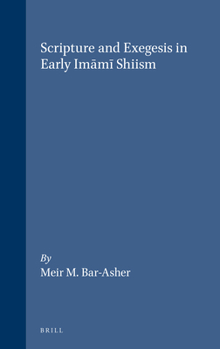Scripture and Exegesis in Early Imāmī Shiism
Since the publication in 1921 of Ignaz Goldziher's Die Richtungen der islamischen Koransauslegung, which includes a discussion of Imāmī exegesis, no comprehensive work on this topic has appeared. In the intervening years, important Imāmī commentaries on the Qur'ān have become available, making possible a reappraisal of the subject. The present study aims to contribute to this task, primarily by examining the features and methods of Imāmī exegesis. Principally, it offers a description and analysis of the major tenets of Imāmī doctrine, as reflected in the earliest Imāmī works of exegesis and related sources, up to the Major Occultation of the twelfth Imam in 329/941. These include, among others, the belief in a primordial covenant between God and the Shī'a, and the superhuman and mystical qualities with which the Imams were graced, such as their God-given, infinite knowledge, their intercession on behalf of their community, their immunity from sin and error, etc. Other tenets relate to the attitude of Imāmī Shī'ism to its enemies, e.g. the duty to denigrate and dissociate from them. These and similar ideas are constant motifs in Imāmī exegesis, and are linked time and again with various Qur'ānic verses.
Relying on classical and modern Arabic sources, Sunnī and Shī'ī alike, as well as on a wide range of western research, Meir Bar-Asher sheds new light on the Imāmī methods of exegesis and on the principal Imāmī doctrines as reflected in the early Imāmī exegetical corpus.
Relying on classical and modern Arabic sources, Sunnī and Shī'ī alike, as well as on a wide range of western research, Meir Bar-Asher sheds new light on the Imāmī methods of exegesis and on the principal Imāmī doctrines as reflected in the early Imāmī exegetical corpus.
Format:Hardcover
Language:English
ISBN:9004114955
ISBN13:9789004114951
Release Date:August 1999
Publisher:Brill
Length:292 Pages
Weight:1.28 lbs.
Dimensions:0.9" x 6.6" x 9.7"
Customer Reviews
0 rating





